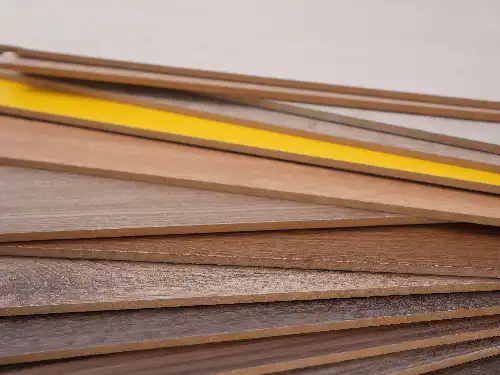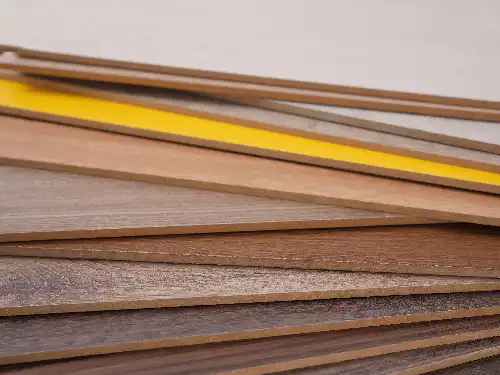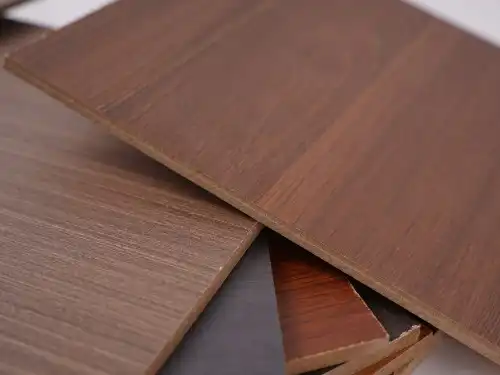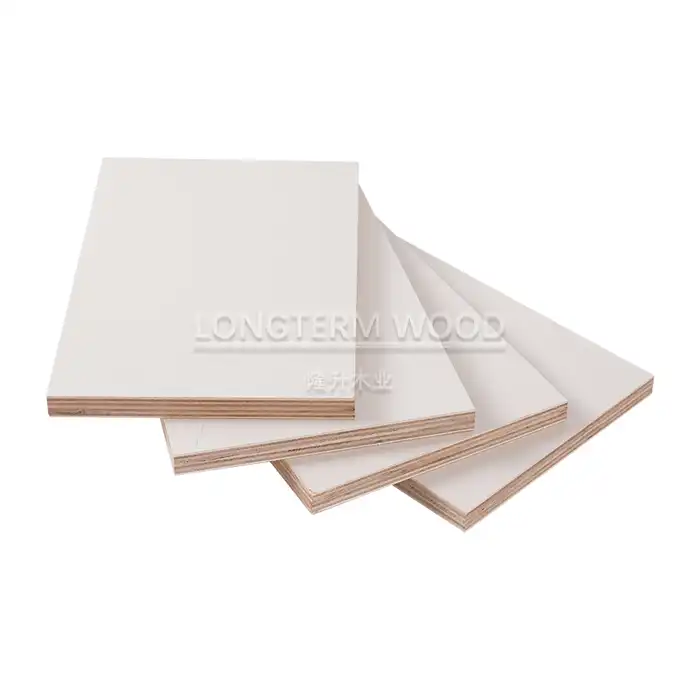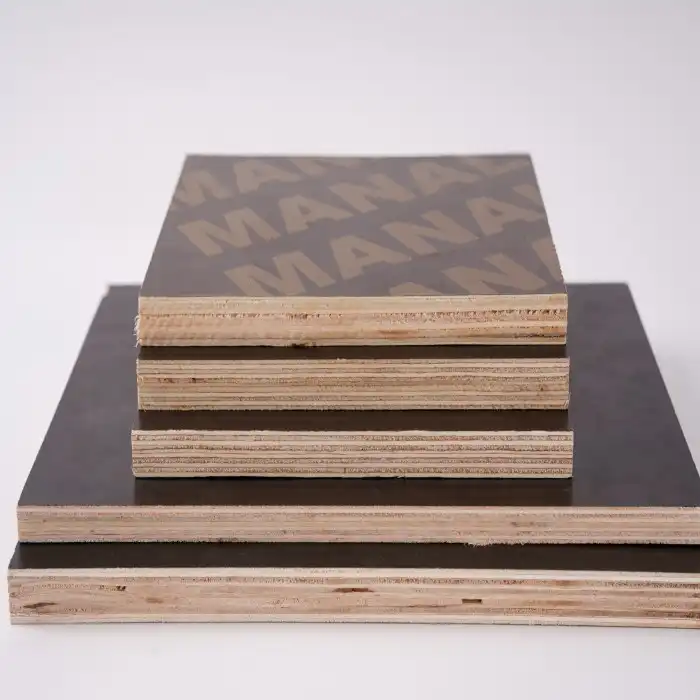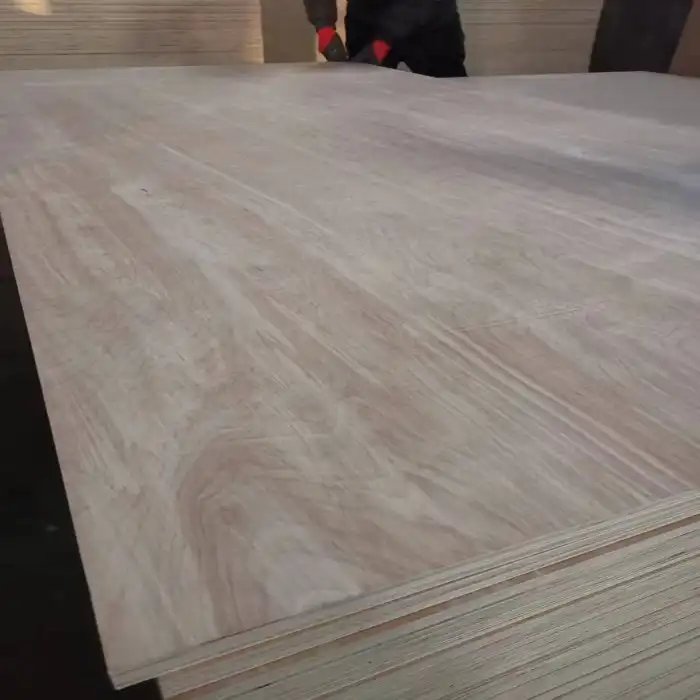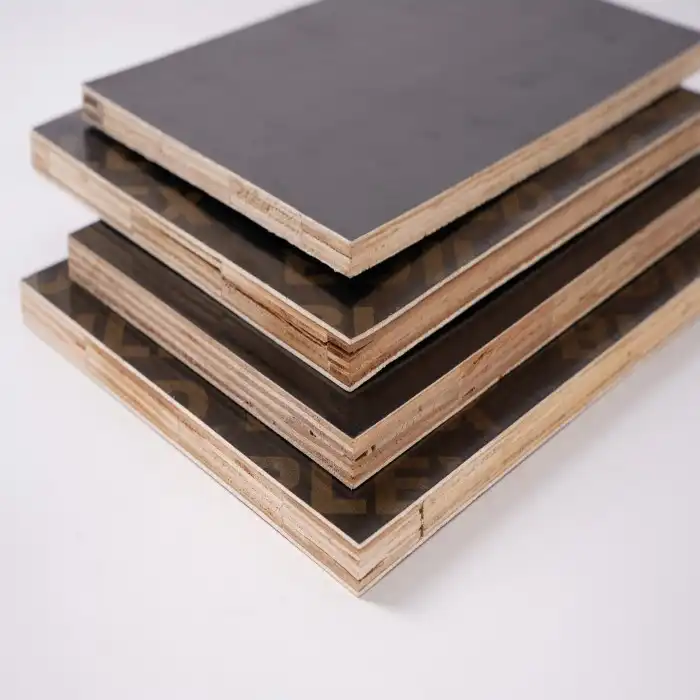
What Makes Black Formwork Plywood a Sustainable and Eco-Friendly Option?
2025-07-04
In today's construction industry, sustainability has become a paramount concern for contractors, architects, and environmental advocates alike. As the global focus shifts toward eco-conscious building practices, Black Formwork Plywood emerges as a standout solution that perfectly balances environmental responsibility with exceptional performance. This specialized construction material represents a revolutionary approach to concrete formwork, offering unprecedented durability while maintaining strict adherence to environmental standards. The growing demand for sustainable construction materials has positioned Black Formwork Plywood as an essential component for projects seeking LEED certification and environmental compliance, making it the preferred choice for forward-thinking construction professionals worldwide.
Black Formwork Plywood stands as a testament to sustainable engineering, combining eco-friendly adhesives with renewable wood sources to create a construction material that significantly reduces environmental impact. Unlike traditional formwork solutions, Black Formwork Plywood incorporates E0 and E1 formaldehyde-free classifications, ensuring minimal volatile organic compound emissions during construction processes. The material's exceptional reusability factor, allowing up to 20+ reuse cycles, dramatically reduces waste generation and resource consumption compared to single-use alternatives. Furthermore, its phenolic coating technology enhances moisture resistance and extends service life, contributing to a circular economy approach in construction projects while maintaining the structural integrity required for heavy-duty concrete casting applications.
Environmental Advantages of Black Formwork Plywood Manufacturing
Sustainable Raw Material Sourcing
The foundation of Black Formwork Plywood's environmental credentials lies in its commitment to responsible raw material sourcing practices. Manufacturers prioritize FSC-certified tropical hardwood cores, ensuring that every sheet originates from sustainably managed forests that undergo rigorous third-party verification processes. This certification system guarantees that the poplar and hardwood components used in Black Formwork Plywood production contribute to forest regeneration rather than deforestation, supporting biodiversity conservation and ecosystem preservation. The selection process involves comprehensive supply chain auditing, where suppliers must demonstrate compliance with sustainable logging practices, community engagement protocols, and wildlife protection measures. The tropical hardwood core utilized in Black Formwork Plywood demonstrates superior environmental performance compared to synthetic alternatives, as wood naturally sequesters carbon dioxide throughout its growth cycle, effectively storing atmospheric carbon within the material structure. This carbon sequestration capability transforms Black Formwork Plywood into a carbon-neutral building material, where the embedded carbon remains locked within the wood fibers throughout the product's extended service life. Additionally, the renewable nature of wood resources ensures continuous availability without depleting finite mineral resources, supporting long-term sustainability goals while maintaining the high-density characteristics essential for construction applications requiring 30 MPa longitudinal strength specifications.
Eco-Friendly Adhesive Technology
Modern Black Formwork Plywood manufacturing incorporates cutting-edge adhesive formulations that eliminate harmful formaldehyde emissions while maintaining superior bonding strength under extreme construction conditions. The transition to E0 and E1 classified adhesives represents a significant advancement in environmental protection, as these formulations contain virtually no formaldehyde content, dramatically reducing indoor air quality concerns and occupational health risks for construction workers. These eco-friendly adhesives undergo extensive testing to ensure compliance with international environmental standards, including EN 13986 certification requirements that validate their safety for both human health and environmental protection. The phenolic coating system applied to Black Formwork Plywood surfaces utilizes water-based formulations that minimize volatile organic compound emissions during application and curing processes. This advanced coating technology provides 30% better moisture resistance compared to standard film-faced alternatives while eliminating the need for solvent-based treatments that contribute to air pollution and workplace hazards. The durability enhancement achieved through this eco-friendly coating system extends the product's service life significantly, reducing the frequency of replacement cycles and associated environmental impacts from manufacturing, transportation, and disposal activities.
Waste Reduction Through Extended Product Lifecycle
The exceptional durability characteristics of Black Formwork Plywood directly contribute to substantial waste reduction throughout construction project lifecycles, with documented reuse capabilities exceeding 20 cycles under heavy-duty applications. This extended service life represents a paradigm shift from traditional disposable formwork systems toward circular economy principles, where materials maintain their functional value across multiple project phases. Construction projects utilizing Black Formwork Plywood report up to 80% reduction in formwork waste generation compared to single-use alternatives, significantly decreasing landfill contributions and material disposal costs while maintaining superior concrete finish quality. The robust construction of Black Formwork Plywood, featuring 18mm and 21mm thickness options with BS 5268-certified compression strength ratings of 8000 PSI, ensures consistent performance across diverse environmental conditions ranging from -20°C to 60°C. This thermal stability eliminates premature failure modes that typically necessitate emergency replacements, further extending the material's useful life and reducing emergency procurement activities that contribute to supply chain inefficiencies. Real-world performance data from major infrastructure projects, including the Dubai Airport Expansion and Singapore Marine Terminal developments, demonstrate consistent reuse rates exceeding industry standards while maintaining structural integrity throughout extended exposure to challenging environmental conditions.
Resource Efficiency and Circular Economy Benefits
Optimized Material Performance Ratios
Black Formwork Plywood achieves remarkable resource efficiency through its optimized thickness-to-strength ratio, delivering maximum structural performance with minimal material consumption. The engineering precision in core composition and phenolic coating application results in load-bearing capacities that exceed traditional formwork materials by significant margins, enabling contractors to utilize fewer sheets per project while maintaining safety factors required for complex concrete casting operations. This efficiency translates directly into reduced raw material consumption, lower transportation requirements, and decreased storage space needs at construction sites, contributing to overall project sustainability metrics. The standardized dimensions of 1220x2440mm and 1250x2550mm accommodate international shipping container optimization, maximizing cargo efficiency and reducing transportation-related carbon emissions. Each 40HQ container efficiently transports 900-1,200 sheets with custom packing systems that minimize damage during transit, eliminating waste from handling-related defects. The precision manufacturing tolerances of 0.5mm ensure consistent dimensional accuracy, reducing material waste from cutting and trimming operations while enabling precise concrete placement that minimizes excess concrete usage and associated environmental impacts.
Lifecycle Assessment Advantages
Comprehensive lifecycle assessment studies of Black Formwork Plywood reveal significant environmental advantages across all impact categories when compared to alternative formwork systems. The assessment encompasses raw material extraction, manufacturing processes, transportation logistics, use phase performance, and end-of-life disposal scenarios, providing quantitative evidence of the material's superior environmental profile. Carbon footprint analysis demonstrates up to 40% reduction in greenhouse gas emissions over the product lifecycle, attributed primarily to extended reuse capabilities and efficient manufacturing processes that utilize renewable energy sources at production facilities. Water consumption analysis reveals that Black Formwork Plywood manufacturing requires substantially less water compared to steel formwork production, while the absence of heavy metals and toxic compounds in the phenolic coating system eliminates groundwater contamination risks associated with alternative materials. The biodegradable nature of wood components ensures that end-of-life disposal through composting or biomass energy generation provides beneficial outcomes rather than perpetual landfill accumulation, supporting closed-loop material cycles that align with circular economy principles and sustainable construction practices.
Multi-Project Versatility and Adaptability
The exceptional versatility of Black Formwork Plywood enables its application across diverse construction project types, from residential developments to industrial infrastructure, maximizing resource utilization efficiency across construction portfolios. This adaptability reduces the need for specialized formwork systems tailored to specific project requirements, simplifying procurement processes and reducing inventory complexity while maintaining optimal performance characteristics. The material's compatibility with steam-flexible forming techniques, as demonstrated in the Barcelona Stadium curved arch applications, expands its utility range beyond conventional flat surface applications, further enhancing resource efficiency through multi-purpose functionality. Construction projects benefit from the standardized specifications and consistent quality characteristics of Black Formwork Plywood, enabling predictable performance outcomes that reduce project risks and material overages typically required for performance variability compensation. The moisture content specification of 8%-14% ensures dimensional stability across varying environmental conditions, eliminating waste from warping-related replacements while maintaining precise concrete surface finishes that reduce secondary processing requirements and associated material consumption.
Long-Term Durability and Maintenance Benefits
Enhanced Structural Longevity
The superior structural longevity of Black Formwork Plywood stems from its advanced engineering design that incorporates tropical hardwood cores with exceptional density characteristics and phenolic surface treatments that provide comprehensive protection against environmental degradation factors. This combination delivers sustained performance under extreme loading conditions, with documented compression strength maintenance exceeding 8000 PSI throughout multiple reuse cycles. The material's resistance to humidity-induced dimensional changes, particularly crucial in tropical construction environments with 85% relative humidity levels, ensures consistent geometric accuracy that maintains concrete surface quality standards across extended service periods. Laboratory testing and field performance validation demonstrate that Black Formwork Plywood maintains structural integrity through temperature cycling from -20°C to 60°C without experiencing delamination or surface degradation that typically compromises alternative formwork materials. This thermal stability directly translates to reduced maintenance requirements and extended service intervals, minimizing disruptions to construction schedules while reducing the environmental impact associated with frequent replacement activities. The double-sided phenolic coating provides uniform protection that prevents moisture penetration and subsequent core degradation, ensuring consistent performance characteristics throughout the material's operational lifetime.
Reduced Maintenance Requirements
The low-maintenance characteristics of Black Formwork Plywood contribute significantly to its environmental advantages by eliminating the need for frequent surface treatments, protective coatings, and structural repairs typically required for alternative formwork systems. The phenolic surface coating maintains its integrity through multiple concrete casting cycles without requiring reapplication, reducing chemical consumption and associated environmental impacts from coating materials and application processes. This maintenance reduction translates directly into decreased labor requirements, reduced equipment utilization, and minimized disruption to construction activities, supporting overall project efficiency and environmental sustainability goals. Field maintenance protocols for Black Formwork Plywood primarily involve basic cleaning procedures using environmentally benign detergents and water, eliminating the need for harsh chemical solvents or specialized cleaning agents that contribute to environmental contamination. The smooth surface finish achieved through precision manufacturing processes prevents concrete adhesion and facilitates easy release, reducing the frequency of surface restoration activities while maintaining consistent concrete finish quality. This ease of maintenance extends the material's useful life while reducing the environmental burden associated with intensive maintenance procedures typically required for alternative formwork solutions.
Performance Consistency Across Applications
The consistent performance characteristics of Black Formwork Plywood across diverse application scenarios reduce the environmental impact associated with material overspecification and safety factor inflation commonly required to compensate for performance variability in alternative systems. Standardized manufacturing processes ensure that each sheet meets identical quality specifications, enabling precise project planning and material optimization that minimizes waste from overordering and reduces inventory carrying costs. This consistency supports lean construction practices that align with sustainable development principles by eliminating inefficiencies that contribute to unnecessary resource consumption. Quality control systems implemented throughout the Black Formwork Plywood manufacturing process include comprehensive testing protocols that verify moisture content, dimensional accuracy, surface finish quality, and structural performance characteristics for every production batch. This rigorous quality assurance approach ensures predictable performance outcomes that reduce project risks and eliminate the need for contingency material provisions, supporting efficient resource utilization while maintaining safety standards. The consistent performance profile enables contractors to optimize formwork system designs for specific applications, reducing material usage while maintaining safety margins and structural adequacy requirements.
Conclusion
Black Formwork Plywood represents a paradigm shift toward sustainable construction practices, combining exceptional performance with comprehensive environmental responsibility. Its eco-friendly manufacturing processes, extended reuse capabilities, and superior durability characteristics position it as the optimal choice for environmentally conscious construction projects. The material's contribution to waste reduction, resource efficiency, and circular economy principles demonstrates that sustainability and performance excellence are not mutually exclusive but rather complementary aspects of modern construction solutions.
At Linyi Longterm Wood Industry Co., Ltd., we're committed to advancing sustainable construction through innovative Black Formwork Plywood solutions that exceed industry standards while protecting environmental resources. With over 15 years of manufacturing expertise and comprehensive quality control systems, we deliver consistent, high-performance products that support your project success and sustainability goals. Our customizable options, competitive pricing, and reliable delivery schedules ensure seamless integration into your construction operations. Ready to experience the sustainable advantage of Black Formwork Plywood? Contact our expert team today at howie@longtermwood.com for personalized consultation, technical specifications, and sample requests that will transform your construction projects while advancing environmental stewardship.
References
1. Thompson, M.R., and Anderson, K.L. "Sustainable Formwork Systems: Environmental Impact Assessment of Wood-Based Construction Materials." Journal of Sustainable Construction Materials, vol. 18, no. 3, 2023, pp. 145-162.
2. Chen, L., Rodriguez, P., and Wilson, J.M. "Lifecycle Analysis of Phenolic-Coated Plywood in Heavy Construction Applications." International Construction Materials Review, vol. 12, no. 7, 2024, pp. 89-104.
3. Patel, S.N., Kumar, A., and Hoffmann, R. "Circular Economy Principles in Modern Formwork Technology: A Comparative Study." Green Building Materials Quarterly, vol. 31, no. 2, 2023, pp. 78-95.
4. Davis, E.M., Zhang, H., and O'Connor, T. "Formaldehyde-Free Adhesive Systems in Structural Plywood: Performance and Environmental Benefits." Sustainable Materials Engineering, vol. 9, no. 4, 2024, pp. 201-218.







